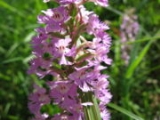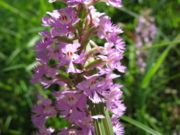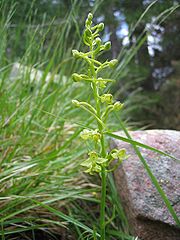
Platanthera
Encyclopedia
The genus
Platanthera belongs to the subfamily Orchidoideae
of the family Orchidaceae
, and comprises about 100 species
of orchids. The members of this genus were previously included in the genus Orchis
, which is a close relative (along with the genus Habenaria
). They are distributed throughout the temperate regions of the Northern Hemisphere
. They are terrestrial and have tubercules.
"orchis", meaning "testicle
", for the appearance of the underground tubercles in some terrestrial species. The word "orchis" was used by Theophrastus
for the first time (371/372 - 287/286 B.C.), in his book "De Historia Plantarum" (On the Natural History of Plants). He was student of Aristotle
and it is considered the father of botany
and ecology
.
Louis Claude Richard chose the name Platanthera for this genus; it comes from the Greek and means "broad or wide anther," referring to the separation of the base of the pollinia in the type species of the genus. Richard felt that this characteristic distinguished the genus Platanthera from both the genus Orchis
and the genus Habenaria
. However, today the defining characteristics of the genus are generally accepted to be the absence of both stigmatic processes (typical in Habenaria
) and ovoid root-tuberoids (characteristic of both Habenaria
and Orchis
).
are typically entire, but in a number of North American species they may be fringed or edentate; in this group of species the labellum
is also often deeply lobed or auricuate. The seed capsules are cylindrical and ridged.
These terrestrial orchids develop in a wide range of soil types and habitats, from strongly basic soils to deeply acidic bog soils, from forest
openings and in clearings within the forest to open tundra. In all cases they require moist soils and are not found in dry or desert locations. While their fleshy tuberculous roots can store water, allowing them to survive temporary drought
, they cannot survived extended drought.
Platanthera may be distinguished from Orchis
and Habenaria
by the absence of stigmatic processes, and the absence of ovoid roots.
The type species is Platanthera bifolia
(L
.) Rich
. 1817
More than 400 species, subspecies, and varieties have been described, of which 85 are clearly defined. Most of this are found distributed about Asia.
52 species from temperate Asian countries (China, Japan, Korea, Taiwan),
13 species from tropical Asian countries (Burma, Indonesia, Papua New Guinea, the Philippines),
37 species from North America north of Mexico,
7 species from Europe.
They include:


Genus
In biology, a genus is a low-level taxonomic rank used in the biological classification of living and fossil organisms, which is an example of definition by genus and differentia...
Platanthera belongs to the subfamily Orchidoideae
Orchidoideae
The Orchidoideae, or the orchidoid orchids, are a subfamily of the orchid family .They typically contain the orchids with a single , fertile anther which is erect and basitonic....
of the family Orchidaceae
Orchidaceae
The Orchidaceae, commonly referred to as the orchid family, is a morphologically diverse and widespread family of monocots in the order Asparagales. Along with the Asteraceae, it is one of the two largest families of flowering plants, with between 21,950 and 26,049 currently accepted species,...
, and comprises about 100 species
Species
In biology, a species is one of the basic units of biological classification and a taxonomic rank. A species is often defined as a group of organisms capable of interbreeding and producing fertile offspring. While in many cases this definition is adequate, more precise or differing measures are...
of orchids. The members of this genus were previously included in the genus Orchis
Orchis
Orchis is a genus in the orchid family . This genus gets its name from the Ancient Greek ὄρχις orchis, meaning "testicle", from the appearance of the paired subterranean tuberoids....
, which is a close relative (along with the genus Habenaria
Habenaria
Habenaria, commonly called bog orchids, are a far ranging genus of orchid, one of approximately 800 described Orchidaceae genera within that large and diverse family. There are species in both tropical and temperate zones.-Description:...
). They are distributed throughout the temperate regions of the Northern Hemisphere
Northern Hemisphere
The Northern Hemisphere is the half of a planet that is north of its equator—the word hemisphere literally means “half sphere”. It is also that half of the celestial sphere north of the celestial equator...
. They are terrestrial and have tubercules.
Etymology
Orchids obtain their name of GreekGreek language
Greek is an independent branch of the Indo-European family of languages. Native to the southern Balkans, it has the longest documented history of any Indo-European language, spanning 34 centuries of written records. Its writing system has been the Greek alphabet for the majority of its history;...
"orchis", meaning "testicle
Testicle
The testicle is the male gonad in animals. Like the ovaries to which they are homologous, testes are components of both the reproductive system and the endocrine system...
", for the appearance of the underground tubercles in some terrestrial species. The word "orchis" was used by Theophrastus
Theophrastus
Theophrastus , a Greek native of Eresos in Lesbos, was the successor to Aristotle in the Peripatetic school. He came to Athens at a young age, and initially studied in Plato's school. After Plato's death he attached himself to Aristotle. Aristotle bequeathed to Theophrastus his writings, and...
for the first time (371/372 - 287/286 B.C.), in his book "De Historia Plantarum" (On the Natural History of Plants). He was student of Aristotle
Aristotle
Aristotle was a Greek philosopher and polymath, a student of Plato and teacher of Alexander the Great. His writings cover many subjects, including physics, metaphysics, poetry, theater, music, logic, rhetoric, linguistics, politics, government, ethics, biology, and zoology...
and it is considered the father of botany
Botany
Botany, plant science, or plant biology is a branch of biology that involves the scientific study of plant life. Traditionally, botany also included the study of fungi, algae and viruses...
and ecology
Ecology
Ecology is the scientific study of the relations that living organisms have with respect to each other and their natural environment. Variables of interest to ecologists include the composition, distribution, amount , number, and changing states of organisms within and among ecosystems...
.
Louis Claude Richard chose the name Platanthera for this genus; it comes from the Greek and means "broad or wide anther," referring to the separation of the base of the pollinia in the type species of the genus. Richard felt that this characteristic distinguished the genus Platanthera from both the genus Orchis
Orchis
Orchis is a genus in the orchid family . This genus gets its name from the Ancient Greek ὄρχις orchis, meaning "testicle", from the appearance of the paired subterranean tuberoids....
and the genus Habenaria
Habenaria
Habenaria, commonly called bog orchids, are a far ranging genus of orchid, one of approximately 800 described Orchidaceae genera within that large and diverse family. There are species in both tropical and temperate zones.-Description:...
. However, today the defining characteristics of the genus are generally accepted to be the absence of both stigmatic processes (typical in Habenaria
Habenaria
Habenaria, commonly called bog orchids, are a far ranging genus of orchid, one of approximately 800 described Orchidaceae genera within that large and diverse family. There are species in both tropical and temperate zones.-Description:...
) and ovoid root-tuberoids (characteristic of both Habenaria
Habenaria
Habenaria, commonly called bog orchids, are a far ranging genus of orchid, one of approximately 800 described Orchidaceae genera within that large and diverse family. There are species in both tropical and temperate zones.-Description:...
and Orchis
Orchis
Orchis is a genus in the orchid family . This genus gets its name from the Ancient Greek ὄρχις orchis, meaning "testicle", from the appearance of the paired subterranean tuberoids....
).
Range
These orchids may be found distributed about the subarctic and temperate zones of the Northern Hemisphere: from Scandinavia to North Africa, Madeira, Iceland, Asia Minor, Russia, the Himalayas, North America and Alaska. Areas of particular diversity include the North America, with 32 species, and eastern Asia, with a similar number of species.Description and Habitat
Species of Platanthera are perennial terrestrial herbs, erect in habit. The roots are fasciculate and typically fleshy and slender, although they may be somewhat tuberous; if tuberous they are lanceolate to fusiform and not ovoid. The leaves are generally fleshy and range from oblong or ovoid to lanceolate. Leaf shape often varies with the lower leaves more ovoid in shape, progressively becoming more lanceolate as they progress up the scape; floral bracts, if present, are lanceolate to linear. The base of the leaves typically sheathes the stem. The inflorescence is terminal and solitary, and the flowers form a cylindrical spike that ranges from sparse to dense. The flowers are typically resupinate, and often showy and colorful. The petals and labellumLabellum
Labellum is the Latin diminutive of labium, meaning lip. These are anatomical terms used descriptively in biology, for example in Entomology and botany.-Botany:...
are typically entire, but in a number of North American species they may be fringed or edentate; in this group of species the labellum
Labellum
Labellum is the Latin diminutive of labium, meaning lip. These are anatomical terms used descriptively in biology, for example in Entomology and botany.-Botany:...
is also often deeply lobed or auricuate. The seed capsules are cylindrical and ridged.
These terrestrial orchids develop in a wide range of soil types and habitats, from strongly basic soils to deeply acidic bog soils, from forest
Forest
A forest, also referred to as a wood or the woods, is an area with a high density of trees. As with cities, depending where you are in the world, what is considered a forest may vary significantly in size and have various classification according to how and what of the forest is composed...
openings and in clearings within the forest to open tundra. In all cases they require moist soils and are not found in dry or desert locations. While their fleshy tuberculous roots can store water, allowing them to survive temporary drought
Drought
A drought is an extended period of months or years when a region notes a deficiency in its water supply. Generally, this occurs when a region receives consistently below average precipitation. It can have a substantial impact on the ecosystem and agriculture of the affected region...
, they cannot survived extended drought.
Platanthera may be distinguished from Orchis
Orchis
Orchis is a genus in the orchid family . This genus gets its name from the Ancient Greek ὄρχις orchis, meaning "testicle", from the appearance of the paired subterranean tuberoids....
and Habenaria
Habenaria
Habenaria, commonly called bog orchids, are a far ranging genus of orchid, one of approximately 800 described Orchidaceae genera within that large and diverse family. There are species in both tropical and temperate zones.-Description:...
by the absence of stigmatic processes, and the absence of ovoid roots.
Species of Platanthera
Many species can cross-fertilise, resulting in great morphological variety and complicating classification.The type species is Platanthera bifolia
Platanthera bifolia
Platanthera bifolia, commonly known as the Lesser Butterfly-orchid, is a species of orchid in the genus Platanthera, having certain relations with the genus Orchis, where it was previously included and also with the genus Habenaria. It can be found throughout Europe and Morocco...
(L
L
Ł or ł, described in English as L with stroke, is a letter of the Polish, Kashubian, Sorbian, Łacinka , Łatynka , Wilamowicean, Navajo, Dene Suline, Inupiaq, Zuni, Hupa, and Dogrib alphabets, several proposed alphabets for the Venetian language, and the ISO 11940 romanization of the Thai alphabet...
.) Rich
Rich
Rich may refer to wealth. Rich may also refer to:- Organizations :* B.C. Rich, guitar manufacturer* Rich Products, international food products corporation* Rich's, U.S. department store retail chain in the southern U.S....
. 1817
More than 400 species, subspecies, and varieties have been described, of which 85 are clearly defined. Most of this are found distributed about Asia.
52 species from temperate Asian countries (China, Japan, Korea, Taiwan),
13 species from tropical Asian countries (Burma, Indonesia, Papua New Guinea, the Philippines),
37 species from North America north of Mexico,
7 species from Europe.
They include:
- North America:

|
Platanthera huronensis Platanthera huronensis is a species of orchid occurring from Canada to the west-central and northeastern United States.... Platanthera hyperborea Description: Platanthera hyperborea is a green to yellowish-green perennial, monocot herb growing 10–90 cm.Similar species: Platanthera hyperborea is similar to Platanthera dilatata, the two hybridize freely, and produce intermediate offspring, the labellum, is strongly dilated at the base in... Platanthera obtusata Platanthera obtusata is a small species of orchid in the genus Platanthera.... |
Platanthera sparsiflora Platanthera sparsiflora is a species of orchid known by the common name sparse-flowered bog orchid. It is native to the forests and meadows of the western United States, where it can be found in wet habitat. It produces a slender, erect flowering stem up to about half a meter tall. The longest... Platanthera psycodes Platanthera psycodes, commonly called Small Purple Fringed-orchid, is a species of orchid occurring from eastern Canada to the east-central and northeastern United States.... Platanthera stricta Platanthera stricta is a species of orchid known by the common name slender bog orchid. It is native to western North America from Alaska to the southwestern United States, where it grows in wet areas, such as shady forest meadows. It produces a slender, erect flowering stem up to about 80... Platanthera tescamnis Platanthera tescamnis is a species of orchid newly described in 2006. The plant is well-known but had been misidentified. It is native to the Great Basin and Colorado Plateau of the United States, where it grows in warmer, drier habitat than most related orchids.It produces a slender, erect... Platanthera yosemitensis Platanthera yosemitensis is a species of orchid that is endemic to nine wet montane meadows between the main stem and the South Fork of the Merced River in Yosemite National Park.... |
- Asia:

|
|
|
- Europe:
- Platanthera algeriensisPlatanthera algeriensisPlatanthera algeriensis is a species of orchid native to eastern and southeastern Spain, Corsica, Sardinia and northwestern Africa....
- Platanthera bifoliaPlatanthera bifoliaPlatanthera bifolia, commonly known as the Lesser Butterfly-orchid, is a species of orchid in the genus Platanthera, having certain relations with the genus Orchis, where it was previously included and also with the genus Habenaria. It can be found throughout Europe and Morocco...
- Platanthera chloranthaPlatanthera chloranthaPlatanthera chlorantha, commonly known as the Greater Butterfly-orchid, is a species of orchid in the genus Platanthera. It can be found throughout Europe and Morocco. The name Platanthera is derived from Greek, meaning "broad anthers", while the species name, chlorantha, means "greenflowered".The...
- Platanthera holmboeiPlatanthera holmboeiPlatanthera holmboei is a species of orchid native to the eastern Mediterranean....
- Platanthera hyperboreaPlatanthera hyperboreaDescription: Platanthera hyperborea is a green to yellowish-green perennial, monocot herb growing 10–90 cm.Similar species: Platanthera hyperborea is similar to Platanthera dilatata, the two hybridize freely, and produce intermediate offspring, the labellum, is strongly dilated at the base in...
- Platanthera obtusata var. oligantha
- Platanthera algeriensis
- North Africa:
- Platanthera algeriensisPlatanthera algeriensisPlatanthera algeriensis is a species of orchid native to eastern and southeastern Spain, Corsica, Sardinia and northwestern Africa....
- Platanthera kuenkelei
- Platanthera algeriensis
- Azores
- Platanthera azorica
- Platanthera micrantha
- Pacific
- Platanthera holochilaPlatanthera holochilaPlatanthera holochila is a rare species of orchid known by the common name Hawaii bog orchid. It is endemic to Hawaii. It is a federally listed endangered species of the United States....
- Platanthera holochila

